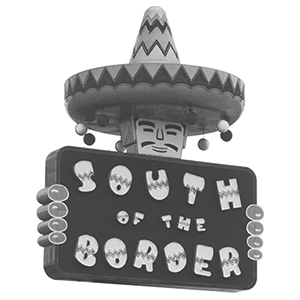Tourist trap is an establishment, or group of establishments, that has been created or re-purposed with the aim of attracting tourists and their money. Tourist traps will typically provide services, entertainment, souvenirs and other products for tourists to purchase.
While the term may have negative connotations for some, such establishments may be viewed by tourists as fun and interesting diversions. In some areas like Ishpeming, Michigan, Flush toilets may be a sufficient draw to entice tourists to stop as they are not readily available at many tourist facilities in Michigan’s Upper Peninsula. Wall Drug, in South Dakota, began its tourist trade simply by offering ice water.
Tourist Trap
Poutine
Poutine [poo-teen] (French: ‘a mess’) is a typical Canadian dish (originally from Quebec), made with french fries, topped with brown gravy (meat stock based) and cheese curds (solid parts of soured milk).
Poutine is sold by fast food chains, in small ‘greasy spoon’ type diners (commonly known as ‘cantines’ or ‘casse-croûtes’ in Quebec) and pubs, as well as by roadside chip wagons (commonly known as ‘cabanes à patates,’ literally meaning ‘potato shacks’). International chains like McDonald’s and KFC sell mass-produced poutine in Canada.
read more »
Prison Sexuality
Prison sexuality deals with sexual relationships between confined individuals or those between a prisoner and a prison employee (or other persons to whom prisoners have access). Since prisons are separated by gender, most sexual activity is conducted with a same-sex partner, often in contradiction to a person’s normal social sexual orientation. Exceptions to this are sex with an employee of the opposite sex, as well as conjugal visits.
According to ‘Human Rights Watch’ 2001 report ‘No Escape: Male Rape in U.S. Prisons,’ sexual slavery frequently poses as a consensual sexual relationship. Rape victims are often intimidated into feigning consent to sexual activity, to the point of becoming ‘slaves’ and the figurative property of their rapists. This occurs in both male and female prisons.
read more »
Animal Treatment in Rodeo
The treatment of animals in rodeo has been a source of concern for the industry, the public, and the law for decades. Protests were first raised in the 1870s, and, in the middle twentieth century, laws were enacted to curb events using animals. The American Humane Association (AHA) has worked with the rodeo industry (specifically, the PRCA, Professional Rodeo Cowboys Association) to establish rules improving animal treatment in rodeo and the treatment of rodeo animals. Today, animal cruelty complaints in rodeo are still very much alive, and continue to be a source of aggravation to the rodeo industry.
The PRCA (which governs about a third of the rodeos conducted in the United States annually) has provided rules for its members regarding animal welfare. Some locals have banned the use of certain rodeo tack (equipment worn by an animal) including flank straps (also called ‘bucking straps,’ irritants which encourage bucking) and certain events such as steer tripping (roping). Some charreada (amateur Mexican-American rodeo) events staged in the United States saw a crack down in the early years of the twenty-first century.
read more »
Mutton Busting
Mutton busting is an event held at rodeos similar to bull riding or bronc riding, in which children ride or race sheep. In the event, a sheep is held still, either in a small chute or by an adult handler while a child is placed on top in a riding position. Once the child is seated atop the sheep, the sheep is released and usually starts to run in an attempt to get the child off.
There are no set rules for mutton busting, no national organization, and most events are organized at the local level. The vast majority of children participating in the event fall off in less than 8 seconds. Organizations such as the ASPCA discourage the practice on the grounds that it does not promote kindness to, or respect of, animals.
Consumerism
Consumerism is a social and economic order that encourages the purchase of goods and services in ever-greater amounts. The term is often associated with criticisms of consumption starting with American economist Thorstein Veblen. However, the term is also used to refer to the consumerists movement, consumer protection or consumer activism, which seeks to protect and inform consumers by requiring such practices as honest packaging and advertising, product guarantees, and improved safety standards.
In economics, consumerism refers to economic policies placing emphasis on consumption. In an abstract sense, it is the belief that the free choice of consumers should dictate the economic structure of a society. Consumerism has weak links with the Western world, but is in fact an international phenomenon. People purchasing goods and consuming materials in excess of their basic needs is as old as the first civilizations.
read more »







